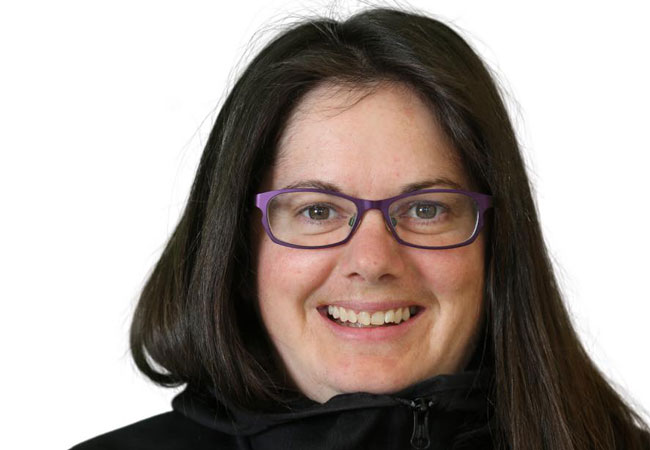“The number one thing I wish more Canadians knew about schizophrenia is that it’s more prevalent than people think and that you can lead a completely fulfilling and rewarding life with schizophrenia.”
According to the Public Health Agency of Canada, more than 360,000 Canadians are living with diagnosed schizophrenia yet this illness remains one that is burdened by misconception and stigma.
Master of Arts in Counselling Psychology student Lesley McCuaig is determined to change that.
“I didn’t seek out advocacy work, it kind of came to me,” said McCuaig. “In 2016, when I was diagnosed with schizophrenia, I was very angry. I thought it was a life sentence to collect CPP [Canadian Pension Plan] disability and stay at home and not accomplish the goals and dreams that I had. Just from the stigma, I didn’t really know what you could do with schizophrenia. I didn’t know you could live a fulfilling, healthy life, because that’s not what is portrayed in the media.”

Now, six years later, McCuaig is flourishing. She is currently completing her practicum placement at The People’s Counselling Clinic in Halifax, Nova Scotia, and has been sharing her story of living with schizophrenia, including a recent conversation on CBC’s The Current.
“I think slowly, but surely, the stigma around schizophrenia is changing, but it’s a matter of raising awareness. That’s why I talk about my experience. Because I’m someone who is functioning very well in my environment and trying to do great things in the mental health field.”
McCuaig was born and raised in Hubbards, a small community on Nova Scotia’s picturesque South Shore. She says growing up here, she had a very simple way of life. Having two older brothers, McCuaig was always trying to keep up with them as they exhausted every way of adventuring in their natural surroundings.
“I didn’t want to be left behind,” she recalled. “So, I grew up biking and sailing and hiking and all those great things outdoors. I spent a lot of time on the water in the summers, and a lot of time on the ski hills in the winter.”
It wasn’t until her mid-20s, when McCuaig was living in British Columbia, that she noticed her mental health deteriorating.
“I started experiencing depression and anxiety. I didn’t know why I was experiencing this. I’d go on anti-depressants and anti-anxiety medications and I’d still have very heightened levels. But what it was is I was also drinking like a fish. I was consuming alcohol at an abundant rate and so the medication wasn’t working.”
A decade of being a daily drinker had taken its toll, so McCuaig decided to attend detox and start her road to sobriety. After detoxing and relapsing twice, she struggled to stay sober on her own, so she checked into a 60-day residential treatment centre where she found the help she needed. McCuaig now celebrates eight and a half years of sobriety.
However, the initial relief that came with sobriety would be short-lived.
“I’ve been through quite a bit,” McCuaig mused. “I thought my alcoholism was the big iceberg, but then things just went really backwards with schizophrenia.”
“A year after I was sober I started hearing auditory hallucinations. I took myself voluntarily to the hospital to get help, but I couldn’t vocally explain what was happening to me.”
Getting Help
McCuaig reflected that this was a time when her behaviour was very strange and erratic. And because she wasn’t “really all that coherent or in touch with reality”, she believed these hallucinations to be real. They would tell her to do something and she would listen.
“I was in and out of the hospital three or four times that summer of 2015, both voluntarily and involuntarily. Ultimately, I was court-ordered to see a psychiatric nurse and it was here that I was open and honest about my symptoms,” she said. “When I finally admitted I was having these hallucinations, they were able to put me on the proper medication and get me counselling and put me with the right support system.”
“So I was able to heal.”
Once that healing got to a point where McCuaig could return to the workforce, she sought employment in accounting, having worked in this field in the past. But this was only a means to an end, she said, because she knew that what she really wanted was to work in the mental health field.
Living with her family back in Hubbards, she discovered Yorkville University’s Master of Arts in Counselling Psychology program.

MACP A Perfect Fit
“I was originally going to do a social work degree but I already had an undergraduate degree so I thought it was a bit redundant,” McCuaig explained. “Then I discovered the MACP program and I thought ‘this is perfect!’, I just felt like it would be the perfect fit and honestly it has been. It’s been an excellent program and a really rewarding experience for me.”
“Without the MACP program, I wouldn’t be able to follow my dreams of working in the mental health field. The MACP Program has changed my life in so many ways. More specifically, it has allowed me to see mental illness from the clinician’s perspective, and not just one of lived experience. The MACP program has also given me a foundation to start a career from, and in turn, has allowed my self-confidence, motivation, and general knowledge to grow.”
Now McCuaig is completing her practicum placement at the People’s Counselling Clinic, where she’s counselling about 20 clients with all sorts of different mental health diagnoses. It’s something she finds incredibly rewarding.
“I’ve worked really hard to be healthy enough to be able to give back,” she said. “And I’m also a peer supporter with the Schizophrenia Society of Nova Scotia, so I give back to that community, as well.”
“I’ve always been someone who likes to achieve things, someone who always sets goals and dreams. Even at my sickest time, I never lost hope. And when I did kind of lose hope, I had people around me who could support me and give me that hope.”
What advice would McCuaig give to someone struggling with their mental health?
“Never give up. Never give up on your goals and dreams. Life will throw you all kinds of obstacles and it’s important to always keep that hope through those obstacles and keep driven.”
Resources:
If you are experiencing symptoms and need help, please contact:
Ontario:
Institute for the Advancement in Mental Health
1-855-449-9949
Nova Scotia:
Schizophrenia Society of Nova Scotia
1-902-465-2601





